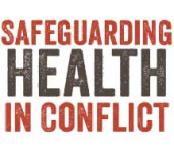
Human Rights Council Should Press Countries for Action
(Geneva) – The United Nations Human Rights Council should strengthen documentation and accountability for the growing number of attacks on health workers, the Safeguarding Health in Conflict Coalition, a group of human rights, health professionals and other nongovernmental groups said today.
At a side event of the Human Rights Council meeting in Geneva, speakers from Turkey, Bahrain, and Pakistan described attacks on healthcare workers for providing care to politically unpopular groups, or because the workers witnessed human rights violations. Other recent attacks have targeted vaccination teams and ambulances. The attacks often receive little attention and no one is held accountable.
“When health workers and hospitals are attacked, people are prevented from getting medical care or are afraid to seek treatment, and trained professionals flee areas where they are urgently needed,” said Leonard Rubenstein, chairman of the coalition. “If people who attack healthcare workers get away with it, the consequence can be the collapse of the health system and even greater suffering.”
The panel discussion, sponsored by the governments of Norway and Switzerland, and co-sponsored by Human Rights Watch and Physicians for Human Rights, identified the need for greater documentation of attacks, investigations, and accountability. Speakers urged the Human Rights Council to collaborate with other United Nations agencies to develop strategies to ensure the availability, safety, and security of healthcare workers in situations of violence.
“Medical staff and facilities provide crucial services, and should never become targets or battlegrounds,” said Dr. Vincent Iacopino, senior medical adviser at Physicians for Human Rights. “We have to put mechanisms in place to document attacks, and hold those responsible accountable so that courageous doctors, nurses, ambulance drivers, and others are never again attacked for doing their job of caring for vulnerable people.”
Speakers called for increased funding to train health professionals and to make health infrastructure safer and more secure.
“Health workers all over the world deserve protection so they can go about saving lives,” said Dr. Rula Al-Saffar, president of the Bahrain Nursing Society. “We need the Human Rights Council to act now to enable these workers to serve their patients without putting themselves in harm’s way.”
Dr. Mirzali Azhar, general secretary of the Pakistan Medical Society, said that, “Volunteers supporting the health and development agenda in Pakistan are neither welcome nor safe.”
Some progress has been made in addressing attacks on and interference with healthcare. In 2012, the World Health Assembly mandated the World Health Organization to provide global leadership to collect data on attacks in humanitarian emergencies. The UN Security Council extended accountability mechanisms to protect children and education in armed conflict to include attacks on schools and hospitals. The Independent International Commission of Inquiry on the Syrian Arab Republic reported on attacks on medical personnel and healthcare institutions earlier in September.
Speakers at the September 20 event called on the Human Rights Council to press member countries to assure that their healthcare services are protected against assaults or interference by third parties, and to repeal laws that penalize providing healthcare based on the identity or perceived political views of the patient.
“The role of human rights law, including the right to health, as a complement to international humanitarian law in guaranteeing freedom from interference with healthcare, is far clearer than in the past,” said Joe Amon, health and human rights director at Human Rights Watch. “Now the Human Rights Council has an opportunity to push further, and ensure that attacks on healthcare workers are universally condemned, and that those responsible for these vicious assaults are held accountable.”

